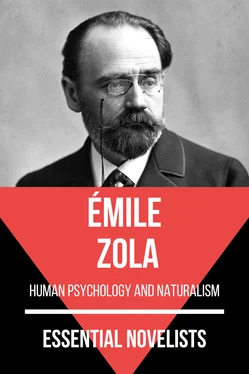1 ...7 8 9 11 12 13 ...41 "What's that?"
And when Maheu had told him the story he added between his teeth:
"These men are eating the bread of girls."
The two men exchanged a look, lighted up by one of those instinctive hatreds which suddenly flame up. Étienne had felt the insult without yet understanding it. There was silence, and they got to work. At last all the seams were gradually filled, and the cuttings were in movement at every level and at the end of every passage. The devouring shaft had swallowed its daily ration of men: nearly seven hundred hands, who were now at work in this giant ant-hill, everywhere making holes in the earth, drilling it like an old worm-eaten piece of wood. And in the middle of the heavy silence and crushing weight of the strata one could hear, by placing one's ear to the rock, the movement of these human insects at work, from the flight of the cable which moved the cage up and down, to the biting of the tools cutting out the coal at the end of the stalls. Étienne, on turning round, found himself again pressed close to Catherine. But this time he caught a glimpse of the developing curves of her breast: he suddenly understood the warmth which had penetrated him.
"You are a girl, then!" he exclaimed, stupefied.
She replied in her cheerful way, without blushing:
"Of course. You've taken your time to find it out!"
––––––––

THE FOUR PIKEMEN HAD spread themselves one above the other over the whole face of the cutting. Separated by planks, hooked on to retain the fallen coal, they each occupied about four metres of the seam, and this seam was so thin, scarcely more than fifty centimetres thick at this spot, that they seemed to be flattened between the roof and the wall, dragging themselves along by their knees and elbows, and unable to turn without crushing their shoulders. In order to attack the coal, they had to lie on their sides with their necks twisted and arms raised, brandishing, in a sloping direction, their short-handled picks.
Below there was, first, Zacharie; Levaque and Chaval were on the stages above, and at the very top was Maheu. Each worked at the slaty bed, which he dug out with blows of the pick; then he made two vertical cuttings in the bed and detached the block by burying an iron wedge in its upper part. The coal was rich; the block broke and rolled in fragments along their bellies and thighs. When these fragments, retained by the plank, had collected round them, the pikemen disappeared, buried in the narrow cleft.
Maheu suffered most. At the top the temperature rose to thirty-five degrees, and the air was stagnant, so that in the long run it became lethal. In order to see, he had been obliged to fix his lamp to a nail near his head, and this lamp, close to his skull, still further heated his blood. But his torment was especially aggravated by the moisture. The rock above him, a few centimetres from his face, streamed with water, which fell in large continuous rapid drops with a sort of obstinate rhythm, always at the same spot. It was vain for him to twist his head or bend back his neck. They fell on his face, dropping unceasingly. In a quarter of an hour he was soaked, and at the same time covered with sweat, smoking as with the hot steam of a laundry. This morning a drop beating upon his eye made him swear. He would not leave his picking, he dealt great strokes which shook him violently between the two rocks, like a fly caught between two leaves of a book and in danger of being completely flattened.
Not a word was exchanged. They all hammered; one only heard these irregular blows, which seemed veiled and remote. The sounds had a sonorous hoarseness, without any echo in the dead air. And it seemed that the darkness was an unknown blackness, thickened by the floating coal dust, made heavy by the gas which weighed on the eyes. The wicks of the lamps beneath their caps of metallic tissue only showed as reddish points. One could distinguish nothing. The cutting opened out above like a large chimney, flat and oblique, in which the soot of ten years had amassed a profound night. Spectral figures were moving in it, the gleams of light enabled one to catch a glimpse of a rounded hip, a knotty arm, a vigorous head, besmeared as if for a crime. Sometimes, blocks of coal shone suddenly as they became detached, illuminated by a crystalline reflection. Then everything fell back into darkness, pickaxes struck great hollow blows; one only heard panting chests, the grunting of discomfort and weariness beneath the weight of the air and the rain of the springs.
Zacharie, with arms weakened by a spree of the night before, soon left his work on the pretence that more timbering was necessary. This allowed him to forget himself in quiet whistling, his eyes vaguely resting in the shade. Behind the pikemen nearly three metres of the seam were clear, and they had not yet taken the precaution of supporting the rock, having grown careless of danger and miserly of their time.
"Here, you swell," cried the young man to Étienne, "hand up some wood."
Étienne, who was learning from Catherine how to manage his shovel, had to raise the wood in the cutting. A small supply had remained over from yesterday. It was usually sent down every morning ready cut to fit the bed.
"Hurry up there, damn it!" shouted Zacharie, seeing the new putter hoist himself up awkwardly in the midst of the coal, his arms embarrassed by four pieces of oak.
He made a hole in the roof with his pickaxe, and then another in the wall, and wedged in the two ends of the wood, which thus supported the rock. In the afternoon the workers in the earth cutting took the rubbish left at the bottom of the gallery by the pikemen, and cleared out the exhausted section of the seam, in which they destroyed the wood, being only careful about the lower and upper roads for the haulage.
Maheu ceased to groan. At last he had detached his block, and he wiped his streaming face on his sleeve. He was worried about what Zacharie was doing behind him.
"Let it be," he said, "we will see after breakfast. Better go on hewing, if we want to make up our share of trams."
"It's because it's sinking," replied the young man. "Look, there's a crack. It may slip."
But the father shrugged his shoulders. Ah! nonsense! Slip! And if it did, it would not be the first time; they would get out of it all right. He grew angry at last, and sent his son to the front of the cutting.
All of them, however, were now stretching themselves. Levaque, resting on his back, was swearing as he examined his left thumb which had been grazed by the fall of a piece of sandstone. Chaval had taken off his shirt in a fury, and was working with bare chest and back for the sake of coolness. They were already black with coal, soaked in a fine dust diluted with sweat which ran down in streams and pools. Maheu first began again to hammer, lower down, with his head level with the rock. Now the drop struck his forehead so obstinately that he seemed to feel it piercing a hole in the bone of his skull.
"You mustn't mind," explained Catherine to Étienne, "they are always howling."
And like a good-natured girl she went on with her lesson. Every laden tram arrived at the top in the same condition as it left the cutting, marked with a special metal token so that the receiver might put it to the reckoning of the stall. It was necessary, therefore, to be very careful to fill it, and only to take clean coal, otherwise it was refused at the receiving office.
The young man, whose eyes were now becoming accustomed to the darkness, looked at her, still white with her chlorotic complexion, and he could not have told her age; he thought she must be twelve, she seemed to him so slight. However, he felt she must be older, with her boyish freedom, a simple audacity which confused him a little; she did not please him: he thought her too roguish with her pale Pierrot head, framed at the temples by the cap. But what astonished him was the strength of this child, a nervous strength which was blended with a good deal of skill. She filled her tram faster than he could, with quick small regular strokes of the shovel; she afterwards pushed it to the inclined way with a single slow push, without a hitch, easily passing under the low rocks. He tore himself to pieces, got off the rails, and was reduced to despair.
Читать дальше













